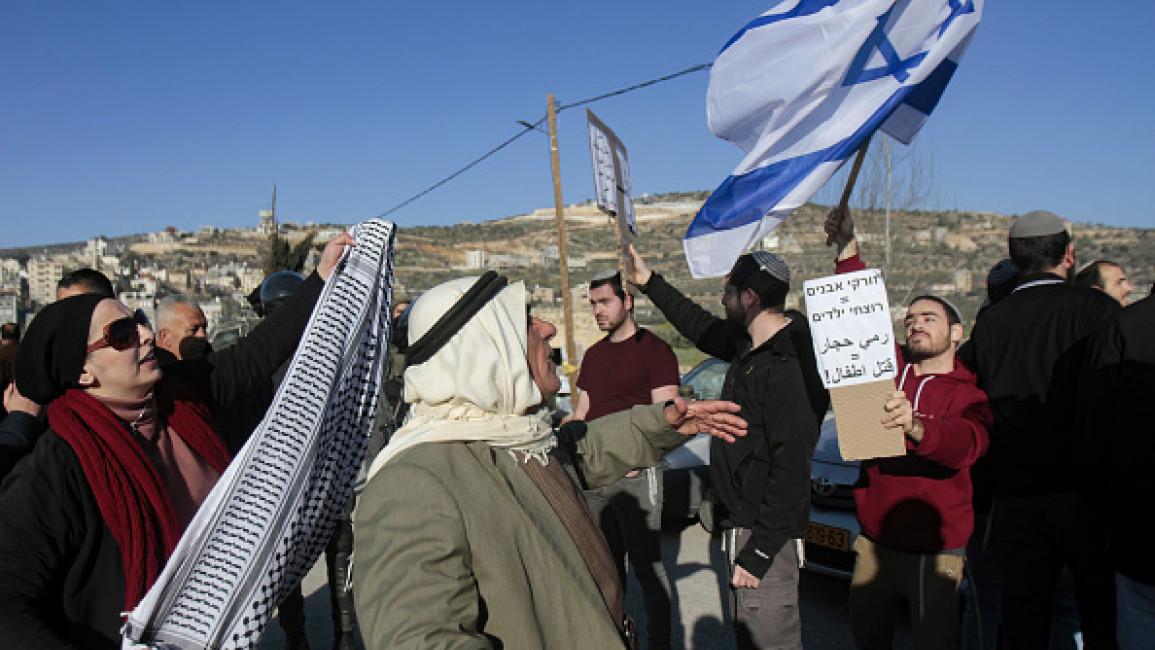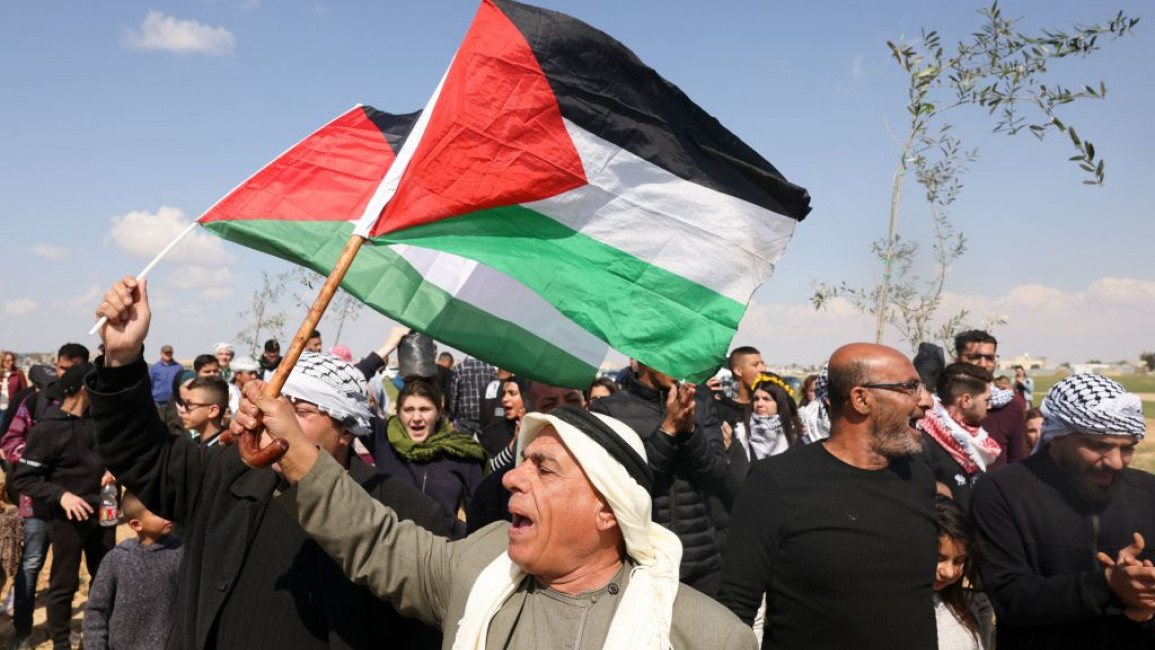The hills around Nablus have become a primary target for new settlements for many years, dispossessing Palestinians of their land in the occupied West Bank

2021 saw the highest number of settler attacks on Palestinians in more than a decade - with no signs of the trend abating [Getty]
Israeli settlers have set up several caravans on Palestinian-owned land in the village of Qusra to the south of Nablus in the occupied West Bank, according to Palestinian News Agency Wafa on Sunday.
Ghassan Daghlas, a local Palestinian official in charge of monitoring Israeli settlement activity, told Wafa that a group of Israeli settlers from the illegal outpost settlement of Magdalim installed the caravans with the aim of expanding on Palestinian land.
Israeli settlers also attacked Palestinian-owned commercial structures and caused damages to a Palestinian vehicle at the entrance of the village of Burqa, northwest of Nablus on the same day, according to Daghlas.
The city of Nablus has become encircled by settlements and unofficial outposts in the last decade, leading to a ten-year peak in violence against Palestinians by settlers in 2021, according to the UN.
Attacks take place across Areas A, B and C - with Palestinians living in Area C, under the control of Israeli Occupying Forces most at risk of violence and dispossession by new settlement projects.
Israel has occupied the West Bank illegally since 1967, and commits various abuses against Palestinian civilians, human rights groups say.
More than 600,000 Jewish Israelis live in settlements in the occupied West Bank and East Jerusalem, in constructions considered illegal under international law.
Elsewhere in occupied Palestinian territories, Israel has on Sunday approved five new settlements in the eastern part of the Negev (also called Naqab in Arabic), amid mounting tensions between local Jewish and Palestinian Bedouin communities over land ownership, Israeli media reported on Sunday.
Israel approves five new settlements in the Negev
The New Arab Staff
27 March, 2022
The newly approved settlements include four for Jewish settlers.
The New Arab Staff
27 March, 2022
the beginning of the year [AHMAD GHARABLI/AFP via Getty]
Israel has on Sunday approved five new settlements in the eastern part of the Negev (also called Naqab in Arabic), amid mounting tensions between local Jewish and Palestinian Bedouin communities over land ownership, Israeli media reported on Sunday.
Four of the approved settlements will be for Jewish settlers, including one kibbutz (agricultural cooperative community), after the cabinet approved it in a committee session that descended into a screaming match following strong opposition from left-wing ministers.
The cabinet decision also authorised the establishment of a Palestinian Bedouin village, an extremely rare provision given that the Israeli government generally denies building permits to members of the local Palestinian communities.
The Negev desert is home to over 300,000 Palestinian Bedouins, who are extremely marginalised and constitute Israel's poorest minority.
Israel has long pursued a policy to sedentarise and concentrate this community in a handful of state-built cities.
While many Bedouins have agreed to live in these cities, others continue to live in their historic villages and cultivate their ancestral lands - much of which is considered by Israel as state property, since Bedouin communities were expropriated at the time of Israel's creation or they failed to register their deeds with the new authorities.
These villages are "unrecognised" by the Israeli government and lack basic services - be it road, electricity, water or schools.
The provision to establish a recognised Bedouin village in the Negev brings Israel's ruling coalition one step closer to fulfilling long-awaited concessions promised to Ra'am, the first Palestinian party to be part of a ruling coalition in Israel.
The Negev is a key base of the party, who promised to push for the recognition of unrecognised Bedouin villages by the Israeli government.
The concession could also be a mean to appease tensions with the Bedouins, which have reached new heights recently over a tree-planting initiative launched by Israeli authorities and targeting several 'unrecognised' Bedouin villages.
A further five Jewish settlements in the southern Negev are also in the early planning stages.
Israel has on Sunday approved five new settlements in the eastern part of the Negev (also called Naqab in Arabic), amid mounting tensions between local Jewish and Palestinian Bedouin communities over land ownership, Israeli media reported on Sunday.
Four of the approved settlements will be for Jewish settlers, including one kibbutz (agricultural cooperative community), after the cabinet approved it in a committee session that descended into a screaming match following strong opposition from left-wing ministers.
The cabinet decision also authorised the establishment of a Palestinian Bedouin village, an extremely rare provision given that the Israeli government generally denies building permits to members of the local Palestinian communities.
The Negev desert is home to over 300,000 Palestinian Bedouins, who are extremely marginalised and constitute Israel's poorest minority.
Israel has long pursued a policy to sedentarise and concentrate this community in a handful of state-built cities.
While many Bedouins have agreed to live in these cities, others continue to live in their historic villages and cultivate their ancestral lands - much of which is considered by Israel as state property, since Bedouin communities were expropriated at the time of Israel's creation or they failed to register their deeds with the new authorities.
These villages are "unrecognised" by the Israeli government and lack basic services - be it road, electricity, water or schools.
The provision to establish a recognised Bedouin village in the Negev brings Israel's ruling coalition one step closer to fulfilling long-awaited concessions promised to Ra'am, the first Palestinian party to be part of a ruling coalition in Israel.
The Negev is a key base of the party, who promised to push for the recognition of unrecognised Bedouin villages by the Israeli government.
The concession could also be a mean to appease tensions with the Bedouins, which have reached new heights recently over a tree-planting initiative launched by Israeli authorities and targeting several 'unrecognised' Bedouin villages.
A further five Jewish settlements in the southern Negev are also in the early planning stages.

No comments:
Post a Comment